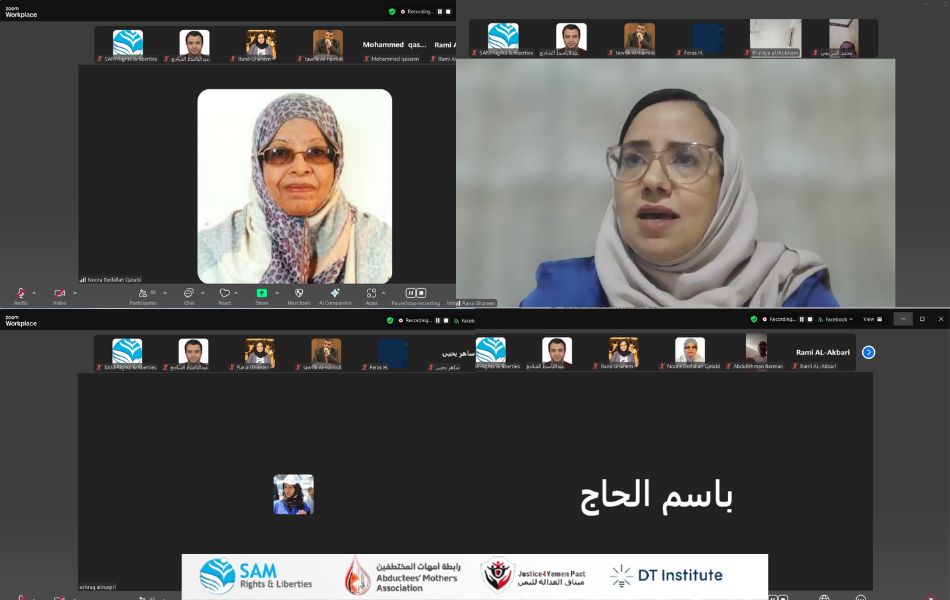
Geneva — SAM Organization for Rights and Liberties, in cooperation with the Abductees’ Mothers Association and in partnership with the DT Institute, organized an online interactive seminar under the title: “National Initiatives in Yemen and Pathways to Transitional Justice – National Experiences Toward Integration.” at the end of June 2025. The event is part of the “SPARK for Transitional Justice” project, in which both organizations participate as members of the "Justice4Yemen" Pact. The seminar aimed to introduce national initiatives operating in the field of transitional justice and to strengthen communication and exchange of experiences among stakeholders in this domain.
Moderated by journalist Abdulbaset Al-Shaja’a, the seminar opened with welcoming remarks from Tawfiq Al-Humeidi, President of SAM, who expressed gratitude to project partners, particularly the Abductees’ Mothers Association and the DT Institute, for their support and participation. He clarified that this was the second in a series of webinars organized by partner organizations to raise local awareness about transitional justice and to highlight the roles played by both governmental and civil society initiatives.
Eshraq Al-Maqtari, a member of the National Commission to Investigate Alleged Human Rights Violations, reviewed the commission’s trajectory since its establishment. She confirmed that the commission had documented over 72,000 violations and referred more than 3,700 cases to the Public Prosecution. However, the absence of an official response has hindered the judicial processing of these cases.
Rana Ghanem, a member of the Consultation and Reconciliation Commission, spoke about the political challenges facing the commission’s work. She explained that the deep political and institutional divisions have obstructed the adoption of key reconciliation documents, pointing to a lack of political will among some factions to advance transitional justice.
In parallel, Judge Noura Qatabi highlighted the work of the committee tasked with addressing the cases of dismissed southern employees. She noted that the committee had received over 120,000 complaints and successfully resolved more than 60,000 of them, despite financial and bureaucratic constraints.
Basem Al-Hajj, a member of the Reconciliation Committee in Taiz, presented a local experience in formulating a comprehensive reconciliation charter. This included provisions for reparations, institutional reforms, and recommendations addressing the issues of forcibly disappeared persons and dismissed employees. He called for these models to be integrated into national reconciliation initiatives.
The seminar featured lively discussions, with participants emphasizing the lack of coordination between initiatives, politicization of certain files, and geographic bias in the work of some organizations. They called for the formation of a unified national framework encompassing all transitional justice efforts, providing a collective platform for advocacy and independent documentation.
Participants underscored that achieving genuine transitional justice in Yemen requires cumulative work, long-term partnerships, and a belief that the human rights track cannot be separated from the political process, but rather intersects with it in building sustainable peace. They considered the seminar’s presentations, experiences, and debates as evidence of growing maturity in the human rights space and an evolving societal will—factors that should not be underestimated.
Organizers confirmed that upcoming phases will include more open discussions and specialized meetings focusing on specific transitional justice issues such as gender, the forcibly disappeared, economic violations, and both national and international legal frameworks. They expressed hope that this participatory human rights momentum would become a force of social pressure capable of pushing toward a fair political settlement—one that respects victims' dignity, ensures non-repetition of violations, and lays the foundation for a genuine and lasting peace grounded in justice.
The seminar concluded with a set of recommendations reflecting a deep understanding of the challenges facing transitional justice in Yemen, while aiming to develop a comprehensive vision that strengthens national initiatives and enhances their integration. The recommendations emphasized the urgent need to establish a unified national coordinating framework that brings together all initiatives in the field. This framework should ensure effective coordination, complementary roles, and unified strategies, including representation from victims, survivors, civil society organizations, and legal and human rights experts.
The recommendations also stressed the importance of expanding rights documentation to include marginalized provinces in recent years, thus reinforcing balanced justice and restoring credibility to current initiatives. In parallel, the seminar called for the meaningful participation of victims in shaping redress mechanisms, building trust through fieldwork, and maintaining direct communication. Participants reaffirmed the importance of official recognition of existing national initiatives and linking them to the outcomes of future political settlements, viewing them as integral components of a homegrown transitional justice process, rather than externally imposed mechanisms.
On the legal and judicial fronts, there were calls to activate previously referred cases to the prosecution and to establish specialized judicial bodies. The seminar also urged the adoption of a national law to govern transitional justice, based on clear and comprehensive standards. Furthermore, it emphasized the need for gradual reparations and compensation where feasible, and concluded by stressing the importance of preserving victims’ collective memory through diverse documentation methods—as a safeguard against repetition and a cornerstone for building a unified national narrative.